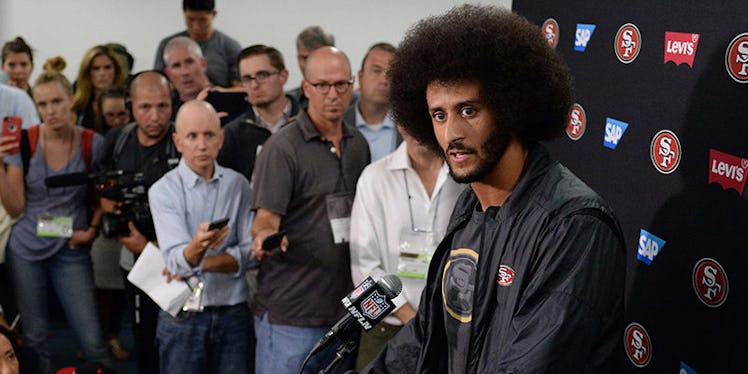
Why It's Time For White NFL Players To Stand Behind Colin Kaepernick
There's no doubt Megan Rapinoe's sexuality played a part in her decision to kneel during the national anthem on Saturday night.
After her NWSL match against the Chicago Red Stars, the Seattle Reign midfielder said it herself,
Being a gay American, I know what it means to look at the flag and not have it protect all of your liberties.
But Rapinoe, one of best and most popular players among the defending Women's World Cup champions, took her explanation to another level when she brought the unavoidable topic of race into the discussion.
On her decision to join 49ers quarterback, Colin Kaepernick, in protest, she said,
It's important to have white people stand in support of people of color on this. We don't need to be the leading voice, of course, but standing in support of them is something that's really powerful.
And those who agree with her might then wonder, why hasn't a white NFL player supported Kaepernick?
At the very least, it's an interesting question. After all, if any athlete were to have enough empathy to stand up for the quarterback, you would think it'd be one of his co-workers in a league that is over 65 percent black, and not a player from a different sport.
The fact that none of his white colleagues have done so falls in line with the rhetoric that has come from Kaepernick's opposition from the start.
"If police brutality is truly a problem," some of his detractors have said, "why doesn't he donate some of his millions to do something about it?"
Others have asked about his silence when it comes to the "real" problem: "Why doesn't he say anything about Chicago and murders in the inner city?"
Those questions add to another that often gets asked about black athletes: Why don't they speak up more?
Whatever way you slice it, it's all the same message: Why don't those guys fix their problem on their own?
The irony here is obvious.
Those questions demand for black people to fix problems that, one, they are saying they didn't create and, two, have been historically proven as nearly impossible to solve without the help of white people.
Those questions are also indicative of what seems to be one Kaepernick's toughest tasks: getting people to see the issues he's talking about as problems for America and not just problems for black people to fix themselves.
After all, if people are aware about, say, Chicago enough to constantly demand black athletes speak out about it, you would think they are aware enough to help out with that problem, too.
Similarly, if everyone agrees certain problems could use the star power of black athletes to bring attention to them, surely the star power of white athletes would help as well.
So, what exactly would it take for white athletes to stand up for issues that predominantly plagues black Americans?
Well, there is a precedent. Take the commercial below, for example.
The men of the NFL might not be able to relate to the problems women face (just like white athletes might not be able to relate to certain struggles black athletes face), but they stood up for women anyway in this ad.
But, there's a big caveat here. This commercial aired after the Ray Rice incident.
What it took for the men to stand up for women in this case was perhaps the single most irrefutable and unavoidable piece of evidence that brought domestic violence issues to real life.
Even before that video, however, there was more than enough information to suggest NFL players should have stood up for women long ago.
We knew, for example, one in three women experience sexual violence. We also knew that the most publicized of these cases usually involves NFL players.
In other words, the information was there, but the public scandal to jolt players into action wasn't.
This narrative is similar to the one of discrimination and racial violence.
Information on systemic issues black Americans face is not hard to find. Because of recent DOJ investigations, we know that racist policies are no stranger to police departments in cities like Ferguson and Baltimore, where high-profile police brutality incidents have occurred.
We also know that in places like North Carolina, politicians are actively trying to suppress the black vote.
Want another example from an NFL state?
Riots erupted in Milwaukee this summer, a city that has been labeled the worst for African Americans because of its history of segregation and overzealous incarceration.
If all of these issues are serious (which everyone seems to agree upon when they demand black athletes address them), then it's hard not to wonder what exactly would it take for someone like Aaron Rodgers to speak out about these things happening in a state where he and his teammates play.
If history is any indication, it might take something as clear, indisputable and visually stimulating as what prompted NFL players to take a stand against domestic violence. In other words, it could require a step above the Philando Castile tape, if you could imagine.
Even if that moment never comes, though, one thing is certain: For the white athletes of the NFL, there's already enough information to prompt them to stand up for -- and with -- their black teammates as there was when they did the same for women.